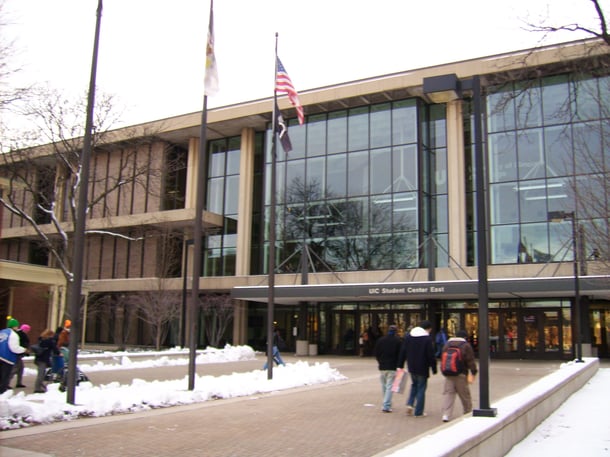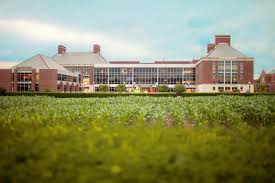According to John Hopkins Medicine, 50 to 80 percent of U.S. adults have the oral herpes virus and many don’t know it. Most commonly associated with “cold sores” or “fever blister” the herpes virus can cause other, more serious symptoms as well. These include severe flu-like symptoms, swollen lymph nodes and headaches. The National Institutes of Health (NIH) recently awarded Afsar Naqvi, assistant professor at the University of Illinois, Chicago’s College of Dentistry, a five year, $2 million grant to study this wide spread and yet often misdiagnosed disease.
Read MoreTags: Bioresearch, Bioresearch funding, University of Illinois, Cannabinoids, University of Illinois Chicago, Illinois, University of Illinois at Chicago, NIH funded Research Projects, Chicago, biotech vendor show, laboratory equipment suppliers, research news, UIC, UIChgo, NIH grants, laboratory suppliers, Biologics, BioResearch Product Faire, virus research

(Image courtesy of Wikimedia commons)
The National Institutes of Health (NIH) awarded a four year, $17.7 million grant to the university of Illinois at Chicago’s Center for Clinical and Transitional Science to further translational research.
Read MoreTags: University of Illinois, University of Illinois Chicago, Translational Research, University of Illinois at Chicago, Chicago, biotech vendor show, NIH award, UI Chicago, UIC, UIChgo, University of Illiniois, 2016, Bioresearch Grant
The University of Illinois at Chicago received a two-year, $475,000 grant to study a new treatment for type 1 diabetes that might help protect the pancreas. This promising new treatment would involve using two protein molecules to reduce the damage caused by the body’s autoimmune response. The research led by Dr. Bellur S. Prabhaker, Professor of Microbiology and Immunology at UIC, could eventually free many diabetes patients from the rigors of daily insulin injections.
Read MoreTags: Bioresearch, Bioresearch funding, University of Illinois, University of Illinois Chicago, Diabetes, Illinois, University of Illinois at Chicago, Chicago, biotech vendor show, UIC, UIChgo, 2016, Dr. Prabhakar, Diabetes research

The University of Illinois at Urbana-Champaign (UIUC) was awarded a $5 million grant to study ways to increase the water use efficiency (WUE) of sorghum, a crop used for bioenergy. Researchers hope to make sorghum an even more practical source of bioenergy by decreasing the plant’s moisture loss so that it can be farmed in lands that would be too arid for traditional sorghum. In fact, they propose to increase the WUE for their sorghum by as much as 40%.
Read MoreTags: University of Illinois, University of Illinois Urbana-Champaign, UIUrbana, 2016, BioResearch Product Faire
Low-density Lipoprotein (LDL) has been considered to be the major cause of heart disease. However, Professor Fred Kummerow from the University of Illinois recently drew a different conclusion on this issue based on his six-decades research.
Tags: 2014, Midwest, University of Illinois, Urbana-Champaign, UIUrbana, BioResearch Product Faire Event, Chicago, IL, UIChgo, UI
It’s no big surprise that as the world’s population increases, worldwide food production will need a fairly big boost in order to keep up with the growing number of mouths to feed. A study by the Food and Agriculture Organization (FAO) of the United Nations estimates that we will need to produce approximately 70 percent more food by the year 2050, at which point the world will be home to about 2.3 billion more people than today. Working to boost agricultural yield is thus a critical field of study, as the photosynthesis optimization team at the University of Illinois, Urbana-Champaign knows quite well.
Tags: 2014, University of Illinois, Urbana-Champaign, Illinois, UIUrbana, BioResearch Product Faire Event, IL, UIUC
Gene manipulation is a very fine-tuned science that is prevalent in all sorts of biotechnological lab work. We often think of genes as controlling a very precise function or set of functions; for instance, the particular gene responsible for damaging tissue in gum disease, which we looked at in a previous Ohio State blog, or the gene responsible for pollination features in bees, which we saw in an earlier Michigan State blog. Now a research project from University of Illinois, Chicago introduces a way to delve deeper than even the gene level and look at the roles of individual molecules that the genes influence.
Tags: 2014, Midwest, University of Illinois, BioResearch Product Faire Event, Chicago, IL, UIChgo
Life science researchers and laboratory suppliers alike will want to take note of the networking opportunity coming to the University of Illinois, Urbana-Champaign campus on April 30th, 2014: UI Urbana-Champaign Bioresearch Product Faire™ Event. This event will be the first of two Illinois shows hosted by Biotechnology Calendar Inc. for 2014, and we want you to join us this year.
Tags: 2014, University of Illinois, Urbana-Champaign, BioResearch Product Faire Event, IL, Illiniois
To understand the complex working of biological molecules, sharp images are the key. Electron microscopes do a good job when it comes to inorganic compounds but don’t lend quite as easily to organic molecules, especially if you want to view them alive and in action. Researchers at the University of Illinois, Chicago have developed a new method for imaging biomolecules that solves many of the current problems in the field.
Tags: 2014, Midwest, University of Illinois, BioResearch Product Faire Event, Chicago, IL, UIChgo
It doesn’t take an environmentalist to realize that plastic bags are an environmental hazard. They are notorious for tangling the throats and limbs of animals, and it’s nearly impossible to dispose of them properly since they don’t biodegrade. A new method developed by researchers at the University of Illinois, Urbana-Champaign does one better than disposal: it converts the bags straight into biofuel.
Tags: 2014, University of Illinois, Illinois, BioResearch Product Faire Event, Chicago, IL, UIChgo

